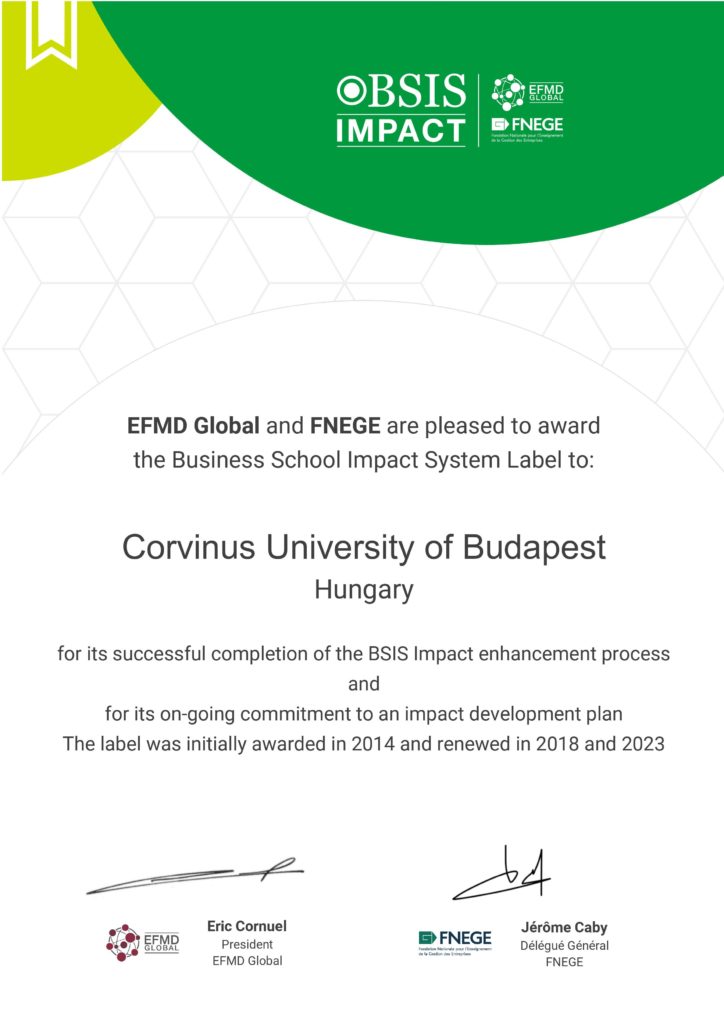The financial impact of the activity of Corvinus University is over HUF 170 billion per year

The contribution of the Corvinus University of Budapest to local and regional economic and social development has been recognised again with the BSIS (Business School Impact) label, and the Corvinus is the only university in Hungary that has this qualification. The impact of the institution of higher education is analysed along seven dimensions: its impact on finances, education, business development, intellectual and social issues, on the image of the region, and the regional ecosystem of the school.
Presently, altogether 62 institutions of 19 countries have impact certificates for a definite period of time, including the University of St. Gallen in Switzerland or the Rotterdam School of Management of the Erasmus University in the Netherlands. The Corvinus University of Budapest was one of the first institutions to undergo an assessment, and after 2014 and 2018, this is the third time the University has received the certification.
‘I am proud to see our results in such a comprehensive and structured way. The BSIS report made it clear that the graduates of Corvinus University have excellent prospects in the labour market, due to the recognition of the University and its leading position in Hungary. In addition, the document pointed out that the majority of senior managers at large companies listed on the Hungarian stock exchange are the graduates of this University, so the Corvinus offers excellent career perspectives. These are clear evidences of the unavoidable embeddedness of our University in Hungarian economic life,’ said Anthony Radev, the President of the Corvinus University of Budapest.
The BSIS report emphasises that the operation of Corvinus University as a foundation and the consequent massive and firm financial background allow the University to make long-term plans and implement its strategy.
According to the document, the University represents a major economic value-creating force in the Hungarian higher education sector. The financial impacts of the University were quantified and estimated at more than HUF 170 billion per year. This amount is made up by direct (the budget and the investments of the institution) and indirect financial impacts (parties in contact with the University, e.g., students, their families, visiting professors, participants of conferences), as well as by the multiplier effect (impact multiplier). Thus, the annual financial impact of Corvinus is equivalent to the annual income of the total population of a medium-sized town (e.g. Szentendre or Jászberény) in Hungary, calculating with average Hungarian wages.
‘The report especially appreciated the progress made by Corvinus in the field of intellectual impact. Since the last BSIS assessment in 2018, research productivity has grown fivefold, and the number of Ph.D. defences, books authored and co-authored, and conference lectures have also increased significantly. The document also explains that international research cooperation efforts are strengthening at Corvinus, research events have become more transparent and attract more and more people’, said Előd Takáts, Rector of Corvinus University.
The BSIS system established in 2013 has been operated for a decade by the international business school accreditation body supported by the European Union, the EFMD (European Foundation for Management Development), in cooperation with FNEGE (the Association for the Management of National Business Education in France). The BSIS qualification can be obtained by EFMD members, the purpose being to define the rate of the impact a school has on its local environment. The complete Corvinus 2023 BSIS report is available on the University’s website.
